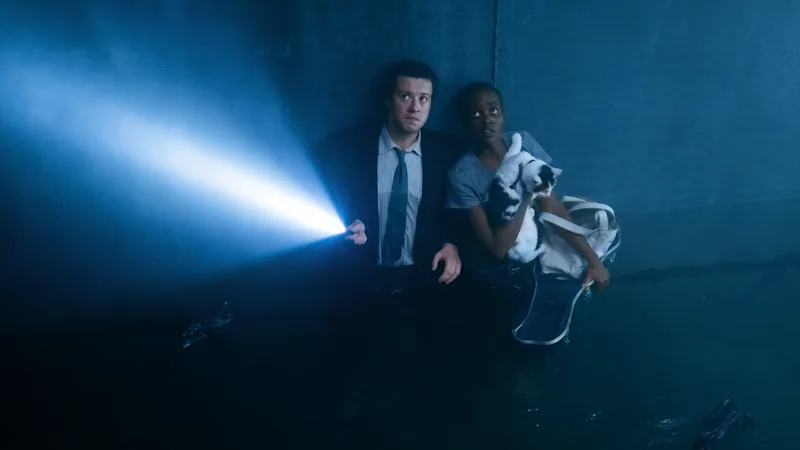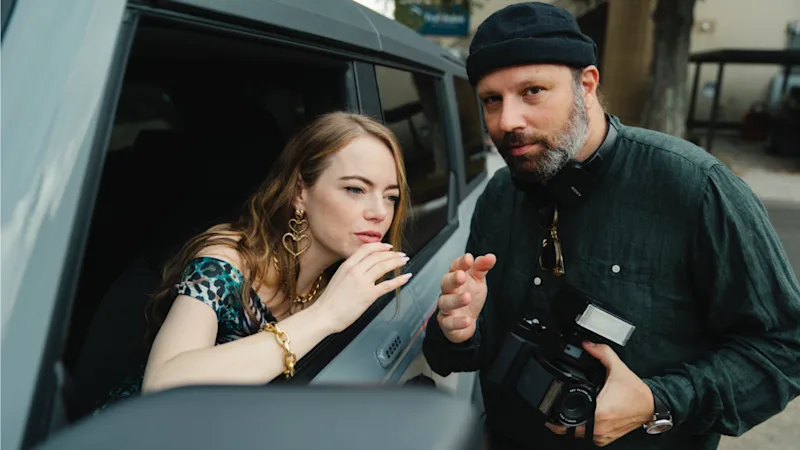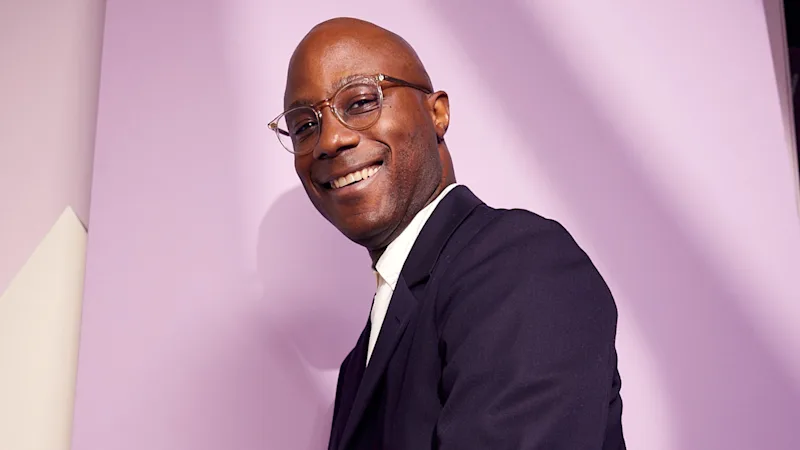About My Father is based on comedian Sebastian Maniscalco's relationship with his Sicilian immigrant father, a relationship he's mined for years of standup material, and now for his first screenplay and first leading role in a film. "When I read the script, I just felt an immediate connection to the material," says director Laura Terruso, "because my mother is a Sicilian immigrant... I felt so connected to the world, and the characters, and the themes of the film, and I pursued it doggedly. This was a story I had to tell."
The comedy stars Sebastian Maniscalco as Sebastian Maniscalco, who is invited to spend the Fourth of July weekend with his fiancée (Leslie Bibb) and his WASPY future in-laws (David Rasche and Kim Cattrall play Bibb's parents, with Anders Holm and Brett Dier as her eccentric brothers). With a bit of encouragement, Sebastian invites his father, Salvo, along too.
"Ultimately, I was so charmed by the character Salvo and how much complexity there was to him. How much heart there was there. How much humor there was," Terruso says. "I knew it was a great role and that it would attract a great actor."
Enter Robert De Niro. Terruso describes working with the two-time Oscar-winning actor as "a masterclass in and of itself." Only three other women have directed De Niro in his 60-year career — Penny Marshall, Agnès Varda and Nancy Meyers — and Terruso is the youngest to do so. In a bid for becoming daughter of the year — nay, century — she was also able to eventually introduce her mother to De Niro, in a case of life imitating art and art imitating life.
"I pitched on this project three years ago, so it's been a long time in the coming. I'm really excited to share it with the world," Terruso says. "I want this to be a unifying film. I want it to be a movie that makes us realize that we're more alike than we are different — that all parents are embarrassed by their kids and all kids are embarrassed by their parents."
A.frame: Once you signed on to direct About My Father, were you able to work on the script? How did that work?
Laura Terruso: Absolutely. I started out as a screenwriter — I'm a writer first — and so I always approach the directing from a place of the script first. So, I did a lot of work on it with Sebastian and Austen [Earl]. I felt like the script was so solid when I got it. The heart was there. It was charming. It was funny. There was so much that worked already. Then it was just about adding authenticity, making it feel contemporary and relevant, making sure that the female characters felt three-dimensional, and that we were paying off on all the storylines. I worked really closely with Sebastian and Austen and I feel so grateful that they were game for that.

Male directors have always been able to tell whatever stories they want to tell. As a female director, what was it like to tell a story from a male perspective?
Well, early in my discussions with Sebastian and the producers, the thing that I said was, 'It's not about gender. This is about this most primal relationship.' It's the relationship between a parent and a child. I guaranteed to Sebastian and the team that I was going to keep this thing free of homophobia, of racism, just to make it timeless. Because ultimately, I don't see this as a film about gender. It's a father-son story, but it's as much a love letter to my mother as it is a love letter to Sebastian's father. It's really about being first generation and being an immigrant and what that experience is and what that means.
What was it like meeting De Niro for the first time?
We developed the film during quarantine, and so I was in my home preparing to Zoom with Robert De Niro. I felt really confident in my vision for the film and my connection to the material, but you're still gearing up for a big interview and meeting. I played "Eye of the Tiger" really loud and danced around my house right before, and then of course they were like, 'He needs to push 15 minutes.' So, I wait 15 minutes, play "Eye of the Tiger" again, dance around my house again. Then when I got on with him, he has this really calm way of making you feel at ease. He's so comfortable in his own skin. He's so authentic in every moment, in every facet of his life, that I felt immediately at ease and could talk to him about why I wanted to make this film and what my vision for it was.
How much did he weigh in on his character?
Working with De Niro was a masterclass in and of itself, in trust, in collaboration. I mean, he's a legend for a good reason. As soon as he understood that I had a personal connection to the material, and that I had a vision for the film and knew how to make a film, he trusted me. And it was so incredible working with somebody who has the best interests. We were so aligned through the entire process. In casting, he weighed in and he wanted to see the tapes and he wanted to know who we were talking to. Every week during prep up to the shoot, he would call me and check in and ask, 'How's it going?' It was such a gift.
And then on set, every moment is authentic. We could have made this whole film with just his first take, because that first take was always dialed-in and authentic. Of course, I directed and we did work on set, but he's an astounding actor to work with. You really are just seeing someone who is such a master of his craft.

There's a scene where Sebastian's character is telling his father, 'You're embarrassing,' and you slowly zoom-in on Salvo's face. De Niro really does so much without saying a word. What was it like to direct him in those moments?
I really wanted to tell the story through Salvo's point of view. It's a two-hander, it's a love story, it's essentially a romantic comedy between a father and a son. Sebastian is narrating, but Salvo is really the heart of the film. So, I really wanted the camera to reflect his emotional state at any given moment in the film. A lot of that is intuitive. I always do a ton of prep before a shoot so that, on the day, I can push that aside and just be in the scene and in the moment and working with the actors. Because during a rehearsal, something might come up that you're like, 'Ooh, I love that.' When we were editing that scene, the editor, Scott Hansen was like, 'Should we cut to Sebastian?' I said, 'No, let's hold on Bob in this moment.' Because it's really about your heart breaking for him in that moment. And that was how I approached the entire process of storytelling.
Because it's a movie about fatherhood, how much did De Niro talk to you about being a father and being inspired by his own family life?
Any work of art should be personal to the people involved in it, and I think as much as this film was about a love letter to my mother, I think this is a love letter to Bob's kids. There's this very dramatic scene outside of an airplane. It's a super emotional scene and a big important scene, and Sebastian was really nervous about it. Because he's a newer actor. At one point, he was having trouble crying, and he got on the plane with Bob and he came off just sobbing. He's like, 'Let's go, let's go!' And I asked Sebastian, I said, 'What did Bob tell you on the plane?' Sebastian said, 'I asked Bob how he gets to that place where he can cry.' And Bob started talking about his own son and how much he loves his son, and then started crying, and then Sebastian started crying. And Sebastian ran off the plane. So, we have to put our hearts in what we do in order for it to feel like anything, to feel like something.
Were there any quotes or little things that you were able to get in there of your own family, of your mom?
So much. There were moments on set where I was like, 'Bob, you just channeled Kathy Terruso. You just did it. That's my mom. You just nailed it.' It felt like he was channeling her. It was incredible. There's a moment where he is like, 'I know I haven't seen your ding-a-ling since then,' and I was like, 'We got to change it to pesciolino.' Throwing in little Italian phrases, like the gagootz in the garden. If you are Italian-American, you know your dad has a garden where he grows gagootz. That's just what it is. So, it was so fun to be able to incorporate all that stuff. That lends so much authenticity.

Who do you think people should bring with them to see this film?
I want people to come to this film and bring their whole family. This is the kind of film where you can bring three generations and everyone can walk away feeling like there was something for them in it. And it's one of the few comedies where there's not going to be an awkward scene where you're like, 'Oh God, my parents are here...' It's funny and it's family-friendly, and you can take your Nona and Nono to see this. Ultimately, the message is about family.
Has your mom seen it?
Yes, I went to New York to screen the Director's Cut for Bob, and Bob said, 'It's a comedy, I want to watch it in a theater with an audience. So, can you get 20 people to show up and we'll watch it in my theater in Tribeca?' I was like, 'Absolutely.' So, my parents came and they invited all their friends. My mom invited all her fellow teachers from P.S. 204 to the screening, and it went really well. None of them have any idea that De Niro's in the back of the theater with me going, 'That's good. I like that.' It was so wild. So, the film ended and De Niro left, and then my phone rings. It's Bob, and he said, 'Come up to my office and bring your parents.' I'm like, 'Oh my God...' I'm like, 'Mom, dad, we got to go.'
We go off to De Niro's office, and my parents are so starstruck. My dad is like, 'I've always wanted to meet the Godfather.' It's just the cutest thing ever. We talked about the film for a bit, and then I was like, 'Okay, well, thank you so much, guys. I'm going to finish up talking to Bob and I'll meet you downstairs.' My mom is like, 'Wait, I have something to say.' I'm like, 'Oh my God. What?!' On the one hand, I'm deeply embarrassed in that moment. And on the other hand, I'm like, 'Well, this is what the movie's about!' So, he knows I'm legit. The thing she wanted to say was, she wanted to tell De Niro she thought his Sicilian in The Godfather Part II was excellent, which was adorable.
That's so sweet.
But in that moment, I'm like, 'Oh my God, what's she going to do?!'
What qualities have your parents instilled in you that you feel like you use in your career as a director?
Work ethic is huge. There is a sense of responsibility that we feel as first-generation kids to succeed and to please our parents in certain ways. For a long time, I felt like I wasn't pleasing them, because I felt like a little bit of a black sheep, and I was gay and I went into film. And this was such a redemption. I introduced them to De Niro. That's basically like introducing your gay friends to Beyoncé. He's like the Pope. So, I feel like all those years of struggle, it really paid off. Now, I can do no wrong.
By Doriean Stevenson
RELATED CONTENT:







